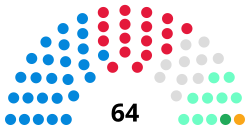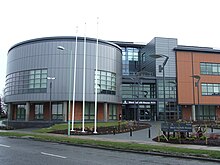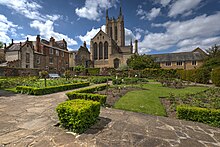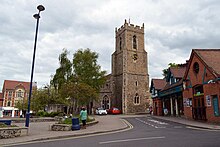For the former administrative county abolished in 1974, see West Suffolk (county). Non-metropolitan district in England
| West Suffolk | |
|---|---|
| Non-metropolitan district | |
 Countryside at Elveden Countryside at Elveden | |
 Coat of arms Coat of arms | |
 West Suffolk district within Suffolk West Suffolk district within Suffolk | |
| Sovereign state | United Kingdom |
| Constituent country | England |
| Region | East of England |
| Non-metropolitan county | Suffolk |
| Status | Non-metropolitan district |
| Admin HQ | Bury St Edmunds |
| Incorporated | 1 April 2019 |
| Government | |
| • Type | Non-metropolitan district council |
| • Body | West Suffolk Council |
| Area | |
| • Total | 400 sq mi (1,035 km) |
| • Rank | 24th of 296 |
| Population | |
| • Total | 182,228 |
| • Rank | 114th of 296 |
| • Density | 460/sq mi (180/km) |
| • Rank | 253rd of 296 |
| Ethnicity (2021) | |
| • Ethnic groups | List |
| Religion (2021) | |
| • Religion |
List
|
| Time zone | UTC0 (GMT) |
| • Summer (DST) | UTC+1 (BST) |
West Suffolk District is a local government district in Suffolk, England. It was established in 2019 as a merger of the previous Forest Heath District with the Borough of St Edmundsbury. The council is based in Bury St Edmunds, the district's largest town. The district also contains the towns of Brandon, Clare, Haverhill, Mildenhall and Newmarket, along with numerous villages and surrounding rural areas. In 2021 it had a population of 180,820.
The neighbouring districts are Mid Suffolk, Babergh, Braintree, South Cambridgeshire, East Cambridgeshire, King's Lynn and West Norfolk and Breckland.
History
Prior to West Suffolk's creation, its predecessors Forest Heath District Council and St Edmundsbury Borough Council had been working together for a number of years, having shared a joint chief executive since 2011. The two districts were formally merged into a new district of West Suffolk with effect from 1 April 2019.
The new district has the same name as the former administrative county of West Suffolk, which was abolished in 1974 under the Local Government Act 1972, but the new district covers a slightly smaller area than the pre-1974 county, which had also included areas now in the Babergh and Mid Suffolk districts.
Governance
| West Suffolk Council | |
|---|---|
 | |
| Type | |
| Type | Non-metropolitan district |
| History | |
| Founded | 1 April 2019 (2019-04-01) |
| Preceded by | St Edmundsbury Forest Heath |
| Leadership | |
| Chair | Pat Hanlon, Labour since 14 May 2024 |
| Leader | Cliff Waterman, Labour since 23 May 2023 |
| Chief Executive | Ian Gallin since 1 April 2019 |
| Structure | |
| Seats | 64 councillors |
 | |
| Political groups |
|
| Elections | |
| Voting system | Plurality block voting |
| Last election | 4 May 2023 |
| Next election | 6 May 2027 |
| Meeting place | |
 | |
| West Suffolk House, Western Way, Bury St Edmunds, IP33 3YU | |
| Website | |
| www | |
West Suffolk Council provides district-level services. County-level services are provided by Suffolk County Council. The whole district is also covered by civil parishes, which form a third tier of local government.
Political control
The council has been under no overall control since the 2023 election. A coalition of Labour, the West Suffolk Independents, Liberal Democrats, Greens and independent councillors formed after the election, led by Labour councillor Cliff Waterman.
A shadow authority comprising the councillors of both outgoing councils was established to oversee the transition to the new authority. The first elections to the new council were held on 2 May 2019, a few weeks after the new district had been created. Political control of the council since 2019 has been as follows:
| Party in control | Years | |
|---|---|---|
| Conservative | 2019–2023 | |
| No overall control | 2023–present | |
Leadership
During the shadow period leading up to the council's creation in 2019, the shadow authority was led by James Waters, leader of the outgoing Forest Heath District Council. He was unsuccessful in securing a seat on the new council at its first elections in May 2019. The first leader of the council appointed after the 2019 election was John Griffiths, who was the last leader of St Edmundsbury Borough Council. The leaders since 2019 have been:
| Councillor | Party | From | To | |
|---|---|---|---|---|
| John Griffiths | Conservative | 22 May 2019 | 23 May 2023 | |
| Cliff Waterman | Labour | 23 May 2023 | ||
Composition
Following the 2023 election and subsequent changes of allegiance up to July 2024, the composition of the council was:
| Party | Councillors | |
|---|---|---|
| Conservative | 26 | |
| Labour | 16 | |
| Independent | 11 | |
| West Suffolk Independents | 9 | |
| Green | 1 | |
| Liberal Democrats | 1 | |
| Total | 64 | |
The Labour, Liberal Democrat, Green Party and one of the independent councillors sit together as the "Progressive Alliance" group, and the West Suffolk Independents and the other ten independent councillors sit together as the "Independents Group". These two groups together form the council's administration. The next election is due in 2027.
Premises
The council is based at West Suffolk House on Western Road in Bury St Edmunds. The building had been completed in 2009 for the former St Edmundsbury Borough Council, also incorporating offices for Suffolk County Council.
Elections
See also: West Suffolk District Council electionsThe council comprises 64 councillors representing 43 wards, with each ward electing one, two or three councillors. Elections are held every four years.
Towns and parishes
Further information: List of civil parishes in Suffolk


The whole district is covered by civil parishes. The parish councils of Brandon, Bury St Edmunds, Clare, Haverhill, Mildenhall and Newmarket all take the style "town council".
- Ampton
- Bardwell
- Barnardiston
- Barnham
- Barningham
- Barrow
- Barton Mills
- Beck Row, Holywell Row and Kenny Hill
- Brandon (town)
- Bradfield Combust with Stanningfield
- Bradfield St Clare
- Bradfield St George
- Brockley
- Bury St Edmunds (town)
- Cavendish
- Cavenham
- Chedburgh
- Chevington
- Clare (town)
- Coney Weston
- Cowlinge
- Culford
- Dalham
- Denham
- Denston
- Depden
- Elveden
- Eriswell
- Euston
- Exning
- Fakenham Magna
- Flempton
- Fornham All Saints
- Fornham St Genevieve
- Fornham St Martin
- Freckenham
- Gazeley
- Great Barton
- Great Bradley
- Great Livermere
- Great Thurlow
- Great Whelnetham
- Great Wratting
- Hargrave
- Haverhill (town)
- Hawkedon
- Hawstead
- Hengrave
- Hepworth
- Herringswell
- Higham
- Honington
- Hopton
- Horringer
- Hundon
- Icklingham
- Ickworth
- Ingham
- Ixworth
- Ixworth Thorpe
- Kedington
- Kentford
- Knettishall
- Lackford
- Lakenheath
- Lidgate
- Little Bradley
- Little Livermere
- Little Thurlow
- Little Whelnetham
- Little Wratting
- Market Weston
- Mildenhall (town)
- Moulton
- Newmarket (town)
- Nowton
- Ousden
- Pakenham
- Poslingford
- Rede
- Red Lodge
- Risby
- Rushbrooke with Rougham
- Santon Downham
- Sapiston
- Stansfield
- Stanton
- Stoke-by-Clare
- Stradishall
- Thelnetham
- The Saxhams
- Timworth
- Troston
- Tuddenham
- West Row
- Westley
- West Stow
- Whepstead
- Wickhambrook
- Withersfield
- Wixoe
- Wordwell
- Worlington
See also
- 2019 structural changes to local government in England
- East Suffolk District, another district that was created in Suffolk on 1 April 2019.
References
- ^ UK Census (2021). "2021 Census Area Profile – West Suffolk Local Authority (E07000245)". Nomis. Office for National Statistics. Retrieved 5 January 2024.
- Ministry of Housing, Communities and Local Government (24 May 2018). "The West Suffolk (Local Government Changes) Order 2018". legislation.gov.uk. Retrieved 12 August 2018.
- "West Suffolk: Councils to merge workforces in move to save cash". East Anglian Daily Times. 27 October 2011. Retrieved 12 August 2018.
- "The English Non-metropolitan Districts (Definition) Order 1972", legislation.gov.uk, The National Archives, SI 1972/2039, retrieved 4 July 2023
- "Council meeting, 14 May 2024". West Suffolk Council. Retrieved 16 May 2024.
- "How your council works". www.westsuffolk.gov.uk. Retrieved 3 March 2022.
- "Local Government Act 1972", legislation.gov.uk, The National Archives, 1972 c. 70, retrieved 31 May 2023
- Green, Tamika (25 May 2023). "Bury St Edmunds councillor Cliff Waterman on 'exciting' new era for West Suffolk Council after being elected coalition leader". Suffolk News. Retrieved 4 July 2023.
- "Council minutes". West Suffolk Council. Retrieved 21 June 2022.
- "Local elections 2023: live council results for England". The Guardian.
- "Your councillors". West Suffolk Council. Retrieved 4 July 2023.
- "West Suffolk". Local Councils. Thorncliffe. Retrieved 21 July 2024.
- Bunn, Roderic. "West Suffolk House" (PDF). Usable Buildings. Retrieved 4 July 2023.
- "The West Suffolk (Electoral Changes) Order 2018", legislation.gov.uk, The National Archives, SI 2018/1375, retrieved 4 July 2023
- "Your Councillors". democracy.westsuffolk.gov.uk. West Suffolk District Council. Retrieved 3 March 2022.
External links
| Ceremonial county of Suffolk | |
|---|---|
| Boroughs or districts | |
| Major settlements (cities in italics) | |
| Topics | |
Categories: